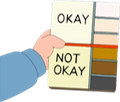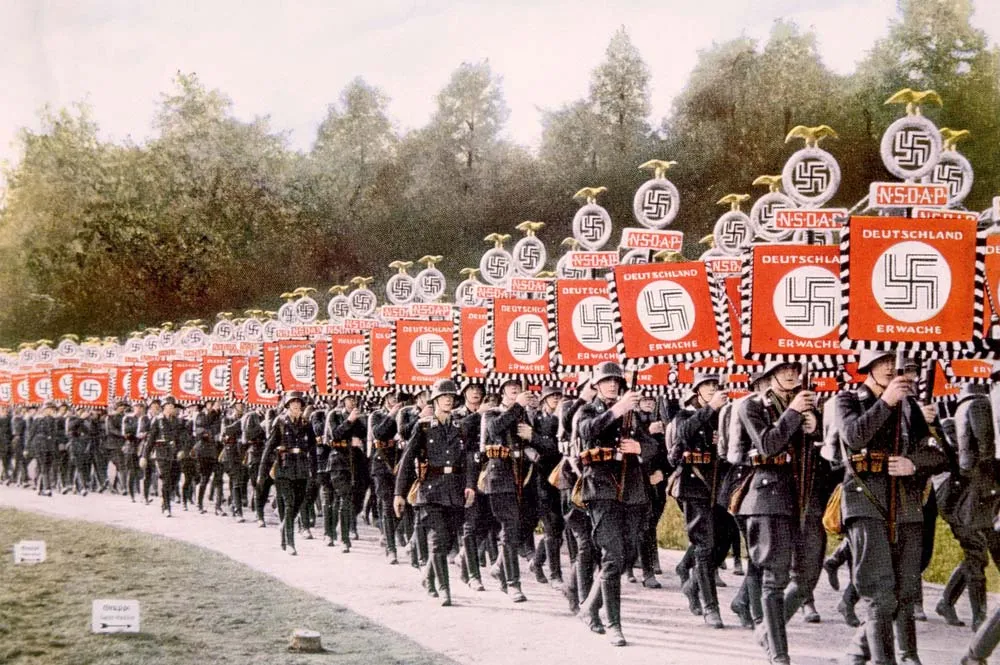-
Fuck you, got mine.

-
DON'T TELL ME WHAT TO DOOOOOOOOOOOOOOOOOOOOOOOO

-
To each their own


Ask Hexbear is the place to ask and answer ~~thought-provoking~~ questions.
Rules:
Posts must ask a question.
If the question asked is serious, answer seriously.
Questions where you want to learn more about socialism are allowed, but questions in bad faith are not.
Try !feedback@hexbear.net if you're having questions about regarding moderation, site policy, the site itself, development, volunteering or the mod team.
Fuck you, got mine. 
DON'T TELL ME WHAT TO DOOOOOOOOOOOOOOOOOOOOOOOO 
To each their own 

Short answer: In the Roman sense, a freedom to exploit and subjugate others.
People like Losordo have pointed out the “dual birth” of Slavery/Colonialism with Liberalism/Democracy. I would argue it’s not even a contradictory dual birth, they are one and the same. Like you said, it’s not just some oversight that the American constitution claims to be a huge protection of human rights while also explicitly outlining the right to own slaves. It’s the point.
Slave owners saw in America an emancipation, a step into freedom, no more pesky British bureaucrats to hold us back from our full potential. Unlimited massacres, unlimited theft, unlimited slavery is the high ideal that was aimed for. For them, America was a massive democratic experiment precisely because it was a massive slavery system. Because, not in spite of.
These are people who have no conception of equality. They believe themselves inherently superior, and they are only truly free if they are allowed to subjugate and dominate and exploit to their hearts content - but only against the rightfully designated targets. Don’t offend other white gentlemen.

It's this one
Constitutional Calvinism

In between the joke answers here that are nonetheless very accurate, it's international white hegemony as mediated through a specific set of property rights.
If an aristocrat in, like, England loses property overseas due to a revolution, they can claim compensation and that compensation can be inherited. If an aristocrat in Vietnam loses property, the only way they can be compensated is by hitching their wagon to "The West", and their claims are not taken seriously if the way they lose property is by opposing "The West".
This isn't even private property as a universal, just private property as interpreted by a pedigree of white property (and particularly, the white ruling class. While being white and working class does have its privileges, my god will The West not give a shit about your property damages or your life if you oppose "Western Values")
If you do not value this, you do not value "Western Values."
(partially formed essay pitch)
What they say:
Democracy, Freedom, Prosperity, Hard Work, International Law
What they mean:
Fascism, Sanctions, oligarchy, war, unilateral hegemony, colonialism
They are champions of human rights. Too bad they don't consider you human.
Pretending to have morals and care about human rights and marginalised peoples whenever those groups can be used to justify imperialist foreign interests.
Forgetting about all of the above whenever human rights or marginalised peoples get in the way of capitalist interests.
"Western Values" is just code for "Whatever helps the interests of our empire and by extension the pockets of the ruling class of it."
Imperialism.
Maybe a vague sense of superiority
The Devil saw me with my head down and thought he'd won... Until I said Amen!!
Hog: Cranked
Pants: Shid
Debbie: Left
Libs: Owned
Gob: Blessed
Hawk: Tuah


White supremacy. Calvinism. Main character syndrome. Greed.
melted cheese
Ahem.
Melted American cheese
 WESTERN values:
WESTERN values:
Be rootin'
Be tootin'
But most of all, be kind. 
 Trying to find out on my own, but I can't. I'd seriously love to know too!
Trying to find out on my own, but I can't. I'd seriously love to know too!
"Work sets you free"

$ & £ & €.
1.50 dollar costco hotdog
Settler freedom: the freedom to steal others' land and profit from others' labor. And most importantly, the freedom from feeling guilty about any of it.
Chauvinism
Civil rights like the right to privacy.
You know the West is value-driven because it would never compromise on a sacred civil right like privacy.
Non-value-driven countries would let governments set up surveillance programs that function without warrants or suspicion, but in the West it's all about liberties and limited government.
White Sumpremecy mostly
Hypocrisy
western values are all of those things that aren't present in the west, like you know equality between people and a lack of racism etc etc
Edward Said, Orientalism and the Occident:
... without examining Orientalism as a [Foucauldian] discourse one cannot possibly understand the enormously systematic discipline by which European culture was able to manage—and even produce—the Orient politically, sociologically, militarily, ideologically, scientifically, and imaginatively during the post-Enlightenment period. Moreover, so authoritative a position did Orientalism have that I believe no one writing, thinking, or acting on the Orient could do so without taking account of the limitations on thought and action imposed by Orientalism. In brief, because of Orientalism the Orient was not (and is not) a free subject of thought or action. This is not to say that Orientalism unilaterally determines what can be said about the Orient, but that it is the whole network of interests inevitably brought to bear on (and therefore always involved in) any occasion when that peculiar entity "the Orient" is in question... ... European culture gained in strength and identity by setting itself off against the Orient as a sort of surrogate and even underground self.
(...)
I have begun with the assumption that the Orient is not an inert fact of nature. It is not merely there, just as the Occident itself is not just there either. We must take seriously Vico's great observation that men make their own history, that what they can know is what they have made, and extend it to geography: as both geographical and cultural entities—to say nothing of historical entities—such locales, regions, geographical sectors as "Orient" and "Occident" are man-made. Therefore as much as the West itself, the Orient is an idea that has a history and a tradition of thought, imagery, and vocabulary that have given it reality and presence in and for the West. The two geographical entities thus support and to an extent reflect each other.
(...)
... ideas, cultures, and histories cannot seriously be understood or studied without their force, or more precisely their configurations of power, also being studied. To believe that the Orient was created—or, as I call it, "Orientalized"—and to believe that such things happen simply as a necessity of the imagination, is to be disingenuous. The relationship between Occident and Orient is a relationship of power, of domination, of varying degrees of a complex hegemony, and is quite accurately indicated in the title of K. M. Panikkar's classic Asia and Western Dominance. The Orient was Orientalized not only because it was discovered to be "Oriental" in all those ways considered commonplace by an average nineteenth century European, but also because it could be—that is, submitted to being—made Oriental. There is very little consent to be found, for example, in the fact that Flaubert's encounter with an Egyptian courtesan produced a widely in- fluential model of the Oriental woman; she never spoke of herself, she never represented her emotions, presence, or history. He spoke for and represented her. He was foreign, comparatively wealthy, male, and these were historical facts of domination that allowed him not only to possess Kuchuk Hanem physically but to speak for her and tell his readers in what way she was "typically Oriental." My argument is that Flaubert's situation of strength in relation to Kuchuk Hanem was not an isolated instance. It fairly stands for the pattern of relative strength between East and West, and the discourse about the Orient that it enabled.
(...)
One ought never to assume that the structure of Orientalism is nothing more than a structure of lies or of myths which, were the truth about them to be told, would simply blow away. I myself believe that Orientalism is more particularly valuable as a sign of European-Atlantic power over the Orient than it is as a veridic discourse about the Orient (which is what, in its academic or scholarly form, it claims to be). Nevertheless, what we must respect and try to grasp is the sheer knitted-together strength of Orientalist discourse, its very close ties to the enabling socio-economic and political institutions, and its redoubtable durability. After all, any system of ideas that can remain unchanged as teachable wisdom (in academies, books, congresses, universities, foreign-service institutes) from the period of Ernest Renan in the late 1840s until the present in the United States must be something more formidable than a mere collection of lies. Orientalism, therefore, is not an airy European fantasy about the Orient, but a created body of theory and practice in which, for many generations, there has been a considerable material investment...
... European culture gained in strength and identity by setting itself off against the Orient as a sort of surrogate and even underground self.
(...)
In any society not totalitarian, then, certain cultural forms predominate over others, just as certain ideas are more influential than others; the form of this cultural leadership is what Gramsci has identified as hegemony, an indispensable concept for any understanding of cultural life in the industrial West. It is hegemony, or rather the result of cultural hegemony at work, that gives Orientalism the durability and the strength I have been speaking about so far. Orientalism is never far from what Denys Hay has called the idea of Europe, a collective notion identifying "us" Europeans as against all "those" non-Europeans, and indeed it can be argued that the major component in European culture is precisely what made that culture hegemonic both in and outside Europe: the idea of European identity as a superior one in comparison with all the non-European peoples and cultures. There is in addition the hegemony of European ideas about the Orient, themselves reiterating European superiority over Oriental backwardness, usually overriding the possibility that a more independent, or more skeptical, thinker might have had different views on the matter.In a quite constant way, Orientalism depends for its strategy on this flexible positional superiority, which puts the Westerner in a whole series of possible relationships with the Orient without ever losing him the relative upper hand. And why should it have been otherwise, especially during the period of extraordinary European ascendancy from the late Renaissance to the present? The scientist, the scholar, the missionary, the trader, or the soldier was in, or thought about, the Orient because he could be there, or could think about it, with very little resistance on the Orient's part. Under the general heading of knowledge of the Orient, and within the umbrella of Western hegemony over the Orient during the period from the end of the eighteenth century, there emerged a complex Orient suitable for study in the academy, for display in the museum, for reconstruction in the colonial office, for theoretical illustration in anthropological, biological, linguistic, racial, and historical theses about mankind and the universe, for instances of economic and sociological theories of development, revolution, cultural personality, national or religious character.
Additionally, the imaginative examination of things Oriental was based more or less exclusively upon a sovereign Western consciousness out of whose unchallenged centrality an Oriental world emerged, first according to general ideas about who or what was an Oriental, then according to a detailed logic governed not simply by empirical reality but by a battery of desires, repressions, investments, and projections. If we can point to great Orientalist works of genuine scholarship like Silvestre de Sacy's Chrestomathie arabe or Edward William Lane's Account of the Manners and Customs of the Modern Egyptians, we need also to note that Renan's and Gobineau's racial ideas came out of the same impulse, as did a great many Victorian pornographic novels (see the analysis by Steven Marcus of "The Lustful Turk") ~p.3,5-9~
(...)
During the early years of the twentieth century, men like Balfour and Cromer could say what they said, in the way they did, because a still earlier tradition of Orientalism than the nineteenth-century one provided them with a vocabulary, imagery, rhetoric, and figures with which to say it. Yet Orientalism reinforced, and was reinforced by, the certain knowledge that Europe or the West literally commanded the vastly greater part of the earth's surface. The period of immense advance in the institutions and content of Orientalism coincides exactly with the period of unparalleled European expansion; from 1815 to 1914 European direct colonial dominion expanded from about 35 percent of the earth's surface to about 85 percent of it.' Every continent was affected, none more so than Africa and AsiaIn the Orient, from the eastern shores of the Mediterranean to Indochina and Malaya, their colonial possessions and imperial spheres of influence were adjacent, frequently overlapped, often were fought over. But it was in the Near Orient, the lands of the Arab Near East, where Islam was supposed to define cultural and racial characteristics, that the British and the French encountered each other and "the Orient" with the greatest intensity, familiarity, and complexity. For much of the nineteenth century, as Lord Salisbury put it in 1881, their common view of the Orient was intricately problematic: "When you have got a . . . faithful ally who is bent on meddling in a country in which you are deeply interested—you have three courses open to you. You may renounce—or monopolize—or share. Renouncing would have been to place the French across our road to India. Monopolizing would have been very near the risk of war. So we resolved to share."
And share they did, in ways that we shall investigate presently. What they shared, however, was not only land or profit or rule; it was the kind of intellectual power I have been calling Orientalism. In a sense Orientalism was a library or archive of information commonly and, in some of its aspects, unanimously held. What bound the archive together was a family of ideas and a unifying set of values proven in various ways to be effective. These ideas explained the behavior of Orientals; they supplied Orientals with a mentality, a genealogy, an atmosphere; most important, they allowed Europeans to deal with and even to see Orientals as a phenomenon possessing regular characteristics. But like any set of durable ideas, Orientalist notions influenced the people who were called Orientals as well as those called Occidental, European, or Western; in short, Orientalism is better grasped as a set of constraints upon and limitations of thought than it is simply as a positive doctrine. If the essence of Orientalism is the ineradicable distinction between Western superiority and Oriental inferiority, then we must be prepared to note how in its development and subsequent history Orientalism deepened and even hardened the distinction. When it became common practice during the nineteenth century for Britain to retire its administrators from India and elsewhere once they had reached the age of fifty-five, then a further refinement in Orientalism had been achieved; no Oriental was ever allowed to see a Westerner as he aged and removedd, just as no Westerner needed ever to see himself, mirrored in the eyes of the subject race, as anything but a vigorous, rational, ever-alert young Raj. ~p.41-42~
(...)
... profoundly anti-empirical ... is the Orientalist attitude in general. It shares with magic and with mythology the self-containing, self-reinforcing character of a closed system, in which objects are what they are because they are what they are, for once, for all time, for ontological reasons that no empirical material can either dislodge or alter. The European encounter with the Orient, and specifically with Islam, strengthened this system of representing the Orient and, as has been suggested by Henri Pirenne, turned Islam into the very epitome of an outsider against which the whole of European civilization from the Middle Ages on was founded. The decline of the Roman Empire as a result of the barbarian invasions had the paradoxical effect of incorporating barbarian ways into Roman and Mediterranean culture, Romania; whereas, Pirenne argues, the consequence of the Islamic invasions beginning in the seventh century was to move the center of European culture away from the Mediterranean, which was then an Arab province, and towards the North. "Germanism began to play its part in history. Hitherto the Roman tradition had been uninterrupted. Now an original Romano-Germanic civilization was about to develop." Europe was shut in on itself: the Orient, when it was not merely a place in which one traded, was culturally, intellectually, spiritually outside Europe and European civilization, which, in Pirenne's words, became "one great Christian community, coterminous with the ecclesia. . . . The Occident was now living its own life." In Dante's poem, in the work of Peter the Venerable and other Cluniac Orientalists, in the writings of the Christian polemicists against Islam from Guibert of Nogent and Bede to Roger Bacon, William of Tripoli, Burchard of Mount Syon, and Luther, in the Poema del Cid, in the Chanson de Roland, and in Shakespeare's Othello (that "abuser of the world"), the Orient and Islam are always represented as outsiders having a special role to play inside Europe.Imaginative geography, from the vivid portraits to be found in the Inferno to the prosaic niches of d'Herbelot's Bibliotheque orientate, legitimates a vocabulary, a universe of representative discourse peculiar to the discussion and understanding of Islam and of the Orient. What this discourse considers to be a fact—that Mohammed is an imposter, for example—is a component of the discourse, a statement the discourse compels one to make whenever the name Mohammed occurs. Underlying all the different units of Orientalist discourse—by which I mean simply the vocabulary employed whenever the Orient is spoken or written about—is a set of representative figures, or tropes. These figures are to the actual Orient—or Islam, which is my main concern here—as stylized costumes are to characters in a play; they are like, for example, the cross that Everyman will carry, the particolored costume worn by Harlequin in a commedia dell'arte play. In other words, we need not look for correspondence between the language used to depict the Orient and the Orient itself, not so much because the language is inaccurate but because it is not even trying to be accurate. What it is trying to do, as Dante tried to do in the Inferno, is at one and the same time to characterize the Orient as alien and to incorporate it schematically on a theatrical stage whose audience, manager, and actors are for Europe, and only for Europe. Hence the vacillation between the familiar and the alien; Mohammed is always the imposter (familiar, because he pretends to be like the Jesus we know) and always the Oriental (alien, because although he is in some ways "like" Jesus, he is after all not like him).
Rather than listing all the figures of speech associated with the Orient—its strangeness, its difference, its exotic sensuousness, and so forth—we can generalize about them as they were handed down through the Renaissance. They are all declarative and self-evident; the tense they employ is the timeless eternal; they convey an impression of repetition and strength; they are always symmetrical to, and yet diametrically inferior to, a European equivalent, which is sometimes specified, sometimes not. For all these functions it is frequently enough to use the simple copula is. Thus, Mohammed is an imposter, the very phrase canonized in d'Herbelot's Bibliotheque and dramatized in a sense by Dante. No background need be given; the evidence necessary to convict Mohammed is contained in the "is." One does not qualify the phrase, neither does it seem necessary to say that Mohammed was an imposter, nor need one consider for a moment that it may not be necessary to repeat the statement. It is repeated, he is an imposter, and each time one says it, he becomes more of an imposter and the author of the statement gains a little more authority in having declared it. Thus Humphrey Prideaux's famous seventeenth-century biography of Mohammed is subtitled The True Nature of Imposture. Finally, of course, such categories as imposter (or Oriental, for that matter) imply, indeed require, an opposite that is neither fraudulently something else nor endlessly in need of explicit identification. And that opposite is "Occidental," or in Mohammed's case, Jesus. ~p.70-72~
A miserable pile of poop
Death, hunger, loneliness, illness, anti-safety, anti-freedom, anti-progress, world destruction, oppression
Imperialism (The State Foreign Policy), Capitalism (Economic Base/Mode of Production), and Reactionism (The Culture)
Some can vary from settler-colonialism, to just pure unequal exchange (read: resource and labor exploitation and drain from the Global South to the Global North)
This is an insanely complicated (and important) topic which grew out of and continues evolving in a shit ton of dialectical history and relations with all that is deemed "not western" as well as the dialectical history and relations with inevolving definition of what is deemed that and how; which would require me to just spam the shit out of your post with Fanon and Said extracts to even remotely hem in some aspects properly, and not hide a bunch of forest behind a few trees (or stumps); which I think I'm gonna do because I seeing that happening to this degree makes me uneasy
creating ethnic categories and then ranking them
patriarchy
separating the acts and awareness of violence from the people it benefits
pretending to be people originating far away that you have basically no relation to
compound interest
$20
The heart of western philosophy is linear, eternal accumulation. This belief is the ultimate western truth.
Honkey
Racism and greed